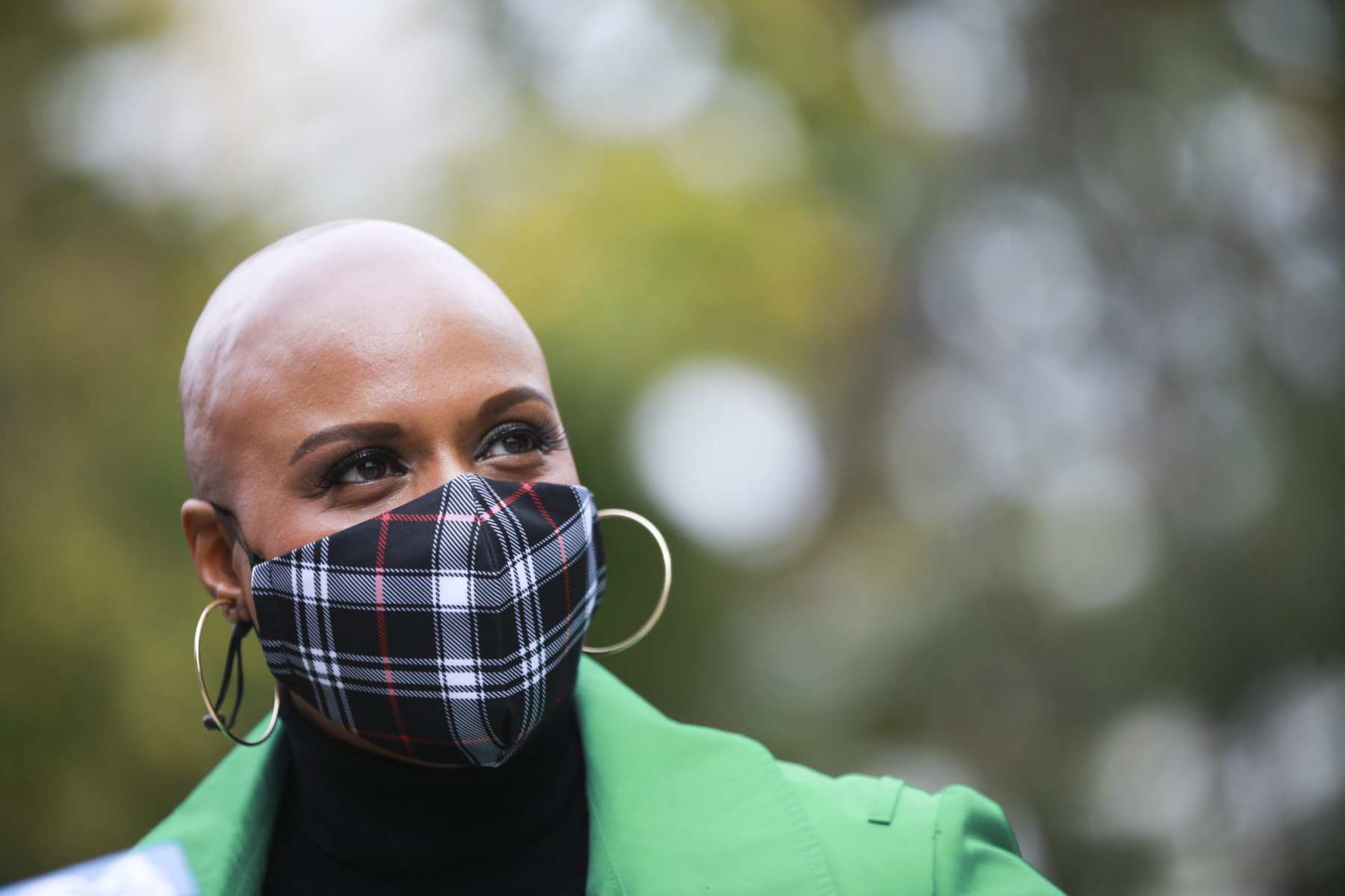On August 15, the national reckoning on race that erupted this summer in the midst of a global pandemic landed at Rep. Ayanna Pressley’s door.
The freshman House member had spoken out on the colliding issues of systemic racism and the COVID-19 pandemic before. But during that Saturday morning interview on MSNBC, the Massachusetts Democrat knew within a matter of minutes that the reaction to her words would be different.
As she had done previously, Pressley was criticizing Postmaster General Louis DeJoy for cutbacks at the U.S. Postal Service ahead of early voting in the general election, adding that it was also threatening delivery of essential packages like medicine to the elderly. She again stressed the need for pandemic relief for Americans struggling economically.
Then, the conversation turned to racial injustice. The framing was the tail end of a quote that had been a familiar refrain for Pressley: “Don’t let up, send emails, make phone calls … the reality is that there will be unrest in the streets for as long as there is unrest in our lives.”
“There are moments in real time when you’re offering something — on a stage in a dais, in an interview — where you become aware: ‘I’m going to experience a lot of vitriol for this,’” Pressley recalled. “I have to say, for this particular moment, I had not anticipated that because it was a framing that I have used many times before.”
For Pressley, it was a nod to the Rev. Martin Luther King Jr.’s warning in 1967 that “a riot is the language of the unheard.” What right-wing media heard was a racial call to arms.
Within hours, Pressley’s quote was all over social media and conservative news platforms. Her office was flooded with thousands of messages, some of them ominous.
“The threats went through the roof,” Pressley said. “Social media creates a really powerful, unaccountable echo chamber [around] my politics, my race, my appearance, just how I show up in the world. What do you do when your very existence is resistance?”
In the two years since Pressley was sworn in as the first Black woman elected to Congress from Massachusetts, she has fought her share of battles. But, she said, the attacks against her have become increasingly threatening, taking a more serious and dangerous tone after her MSNBC appearance this summer triggered death threats. She has had to balance her duties with her personal safety — calls to her office about transportation, public safety and education were dwarfed by messages laced with racism and misogyny. The threatening rhetoric directed at her and her closest colleagues has taken a toll.
“The reality is that these death threats, violent phone calls, the need for private security hires, coordination with Capitol Police and the FBI, this has become part of our daily negotiation of how to serve the people who sent us to Washington,” said Sarah Groh, Pressley’s chief of staff.
Groh said she used to print out mugshots sent by Capitol Police and post them on the office walls so that the team could memorize their faces. Now, she said, there are so many that she needs a binder to hold them.
“That wall staring back at our staff wasn’t healthy,” Groh said. “We made a new wall, one with all of the notes of encouragement and love that we get from people around the country.”
Pressley spoke exclusively to The 19th about this experience as she heads into her second term after winning reelection this fall, in a year that has been marked by both historic firsts and a tipping point on race. In celebrating milestones like the unprecedented number of women of color serving at the highest levels of government, what can get lost in the excitement is the unprecedented amount of vituperation that comes with it, she said.
We signed up for debate, dissenting opinion, to defend our values — but not for abuse and not for threats.
Rep. Ayanna Pressley
“People will say, ‘Well, this is sort of what you signed up for.’ No, we signed up for debate, dissenting opinion, to defend our values — but not for abuse and not for threats,” Pressley said. “We’re at a point where, whether you’re talking about any form of injustice, there are things that we’ve accepted as a part of our lived experience that we’re saying, ‘No longer.’ No one got into this to be a martyr; just because this is happening, doesn’t mean that you have to accept it.”
Many in public life face threats, but in a consequential election year that further polarized the country’s politics around race and gender, Pressley has become a target at a particular intersection, said Rutgers University professor Brittney Cooper.
“She is unapologetically Black in her presentation,” said Cooper, author of “Eloquent Rage,” a book about Black feminism and how it translates into action across our society.
“She does not come, in any way, to play nice with the system,” Cooper continued. “That is why she is a target. There is a concerted effort on the right to de-platform Black women in the public sphere who are challenges to white supremacy, and she’s on their radar.”
Pressley was elected in 2018 as one of the record number of women, many of them pioneers, who would make up the most diverse Congress in U.S. history. She inherited the office space of her “shero,” Shirley Chisholm, the iconic New York legislator who was the first Black woman elected to Congress in 1968 and the first Black woman to run for president as a major party candidate in 1972. Pressley was governing with women she considered her sisters in democracy, including Minnesota Rep. Ilhan Omar, Michigan Rep. Rashida Tlaib and New York Rep. Alexandria Ocasio-Cortez, the three other freshman members of “the squad.”
But the spotlight these women enjoy also has its drawbacks. President Donald Trump took to Twitter on July 14, 2019, to tell Pressley, who was born in Cincinnati, Ohio, and her fellow lawmakers to “go back and fix the totally broken and crime infested places from which they came.” The viral thread soon dominated the news cycle, though the remarks were roundly condemned as racist misinformation (all but Omar, a Somalian refugee who became a naturalized citizen at 17, were born in the United States).
It was the beginning of an onslaught of acrimony that would follow Pressley throughout her first term and as her public profile has risen. (She stumped for then-Democratic presidential hopeful Sen. Elizabeth Warren until Warren suspended her campaign two days after Super Tuesday.)
Pressley has used her platform for much of this year to speak out about the inequalities laid bare by the dual pandemics — first, of the COVID-19 crisis disproportionately killing Black and Latinx people and the attendant economic impact on women and communities of color — and the killings of George Floyd, Breonna Taylor, Ahmaud Arbery and others that urged Americans into the streets in protest by the millions across the country.
Her appearances already curtailed in the pandemic, Pressley said she and her staff took additional precautions following the MSNBC interview in August, like hiring additional security and not promoting appearances or only doing so at the last minute. Though they ended up not needing a Massachusetts reelection campaign headquarters because of COVID, when they explored their options earlier this year, there was concern about having an office on the first floor, and discussions about the number of exits, having the option of a panic button and getting frosted windows.
According to her staff, the threats since this summer have numbered “into the thousands.”
The attacks have also taken a personal toll. In January, Pressley announced that she has alopecia, revealing her bald head for the first time in an emotional video.
“What happens is that you start to internalize it,” she explained to The 19th. “You will go down a rabbit hole, with the most venomous characterizations of you from right-wing media, from the top brass of the GOP, and you will believe it. And it is soul crushing and depleting — and it is effective, because it could make you stand still. It could make you stagnante and just stop altogether. I don’t want to be in a negotiation with myself of, ‘I want to say this, I want to write this law, but I’m fearful of what that will invite.’”
Pressley also acknowledged the impact on her family and staff — many of whom are young people of color. She said she, perhaps naively, didn’t anticipate how the blowback would affect them upon taking office.
“My husband certainly worries,” she said. “My daughter asks a lot of questions. For my staff to be on the frontlines and answering those phones, opening the mail or having to monitor my social media to pull together things to pass along to my threat assessment team, there things are very unnerving for them as well.”
Errin Douglas, a staff assistant for Pressley who first worked for the congresswoman when she served on the Boston City Council, said that fielding hateful messages about her boss has been hurtful and difficult.
At the height of activity sparked by social media campaigns, Douglas estimates that she has come in on a Monday morning to at least 400 voicemails from over the weekend — messages she filters along with the office interns. She described watching “the fear come across their eyes” when a hateful call comes into the office.
You never know when someone is just making a crazy, aggressive call and when they actually mean it.
Errin Douglas, staff assistant to Rep. Ayanna Pressley
“It is something that tears you down day by day,” Douglas, 24, said. This was not in my job description, but it has become part of my job, to make sure to go over these threats … You never know when someone is just making a crazy, aggressive call and when they actually mean it.”
Pressley is particularly protective of Douglas, whom Pressley has known since Douglas was 17.
“With Errin in particular, I did feel a sense of responsibility,” Pressley said. “I know what working on the Hill did for me, it was a very defining moment in my life in my 20s. She was so excited for this, and I was excited for her. I felt guilty.”
For Pressley, the support of Black woman mentors in Congress like New Jersey Rep. Bonnie Watson Coleman, California Reps. Barbara Lee and Karen Bass, Illinois Rep. Robin Kelley and Ohio Rep. Marcia Fudge has been sustaining, as has a “sister circle” group text.
“We create safe space for each other, where we can communicate in that transparency and shorthand, but also where we have developed our own rapid response,” said Pressley, adding that when someone in the thread is attacked online or elsewhere, “We circle the wagons, we rally the troops, and then we go to these platforms, we develop a letter of support or we say, I’m going to headline an event.”
Pressley said she’s also “built up new muscle” over her first term to deal with the attacks, reinforced by 46 years of living as an African American woman.
“The tradition of Black women has been that when we are at the table, we shake the table, that we are disruptors, that we are architects of movements,” Pressley explained. “Two years in, I’m very different than where I was six months in. If I were not making people uncomfortable, then I would not be in the sight line.”
I want people to adjust to the fact that we’re not going anywhere.
Rep. Ayanna Pressley
Other members of the squad agree.
“For decades, it’s been Black women in office and positions of leadership who have borne the brunt of the violent threats from racists and white supremacists,” Rep. Ilhan Omar said. “It’s still that way today for me and Ayanna. But it’s important to remember the purpose of these threats is fear. And while these sorts of threats of course take a toll on us, we are not afraid. And we’re not going anywhere.”
The squad is also getting reinforcements, as more women and people of color who identify as progressive will join their ranks in the incoming Congress. Among them is Democrat Cori Bush of Missouri, a former Black Lives Matter activist whom Pressley reached out to soon after her primary election win in August and has been helping get acclimated to Washington, offering advice and encouragement.
“I don’t feel alone,” Bush said in an interview when asked about her budding relationship with Pressley. “I don’t feel like I have to try to figure it all out on my own. I know that she’s looking out for my best interest … As women, we have to work together, stand together.”
On Election Day, Bush posted a photo on Instagram posing under Chisholm’s Capitol Hill portrait. The photographer? Pressley.
“I want people to adjust to the fact that we’re not going anywhere,” Pressley said. “We have to normalize the idea of having more women in these positions, particularly women of color, but while we’re normalizing our leadership, we have to speak out and continue to shed a light on this abuse, because that can’t be normalized.”





